Publications
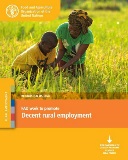
FAO Work to Promote Decent Rural Employment
27/10/2017
This brochure provides an easy-to-read overview of the main components of FAO's approach to mainstreaming decent rural employment at global, regional and country level. Increasing rural women’s access to decent employment opportunities is key to improving their productivity and earning power, which in turn raises family incomes and food security. FAO aims to empower rural women through decent work in order to realize their untapped potential, which can bring social and economic 20 pp.
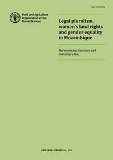
Legal pluralism, women’s land rights and gender equality in Mozambique - Harmonizing statutory and customary law
18/10/2017
This publication analyses the impacts of legal pluralism on women's land rights in Mozambique arguing that despite Mozambique's progressive legal framework, efforts are still needed to fully achieve gender equitable and socially just outcomes on the ground. 61 pp.

Gender Newsletter Asia Pacific September 2017
01/10/2017
This issue contains stories on country level activities and news and updates on events, publications and trainings relater to the gender work in FAO in Asia and the Pacific. There is a report on FAO's contribution to the Sustainable Development Goal Five (SDG5) and a feature article on Isan Indigenous Thai Silk Yarn production. 8 pp.
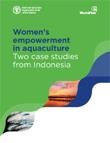
Women’s empowerment in aquaculture: Two case studies from Indonesia
08/08/2017
This study explores women’s empowerment in relation to aquaculture in Indonesia, including associated enabling and constraining factors, positive outcomes and limitations. 132 pp.
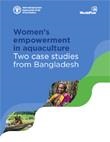
Women's empowerment in aquaculture: Two case studies from Bangladesh
31/07/2017
This study explores women’s empowerment in relation to aquaculture in Bangladesh, including associated enabling and constraining factors, positive outcomes and limitations. 128 pp.
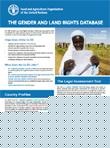
The Gender and Land Rights Database (GLRD): Information Note / Overview
18/07/2017
The FAO Gender and Land Rights Database (GLRD) was launched in 2010 to highlight the major political, legal and cultural factors that influence the realisation of women’s land rights throughout the world. This note provides an overview of its aims and key features. 2 pp.

Rice–rice and rice–shrimp production: A gender perspective on labour, time use and access to technologies and services in southern Viet Nam
12/07/2017
This study focuses on smallholder farms in Soc Trang, southern Viet Nam, and aims to highlight and compare women and men’s contributions to two integrated, rice-based farming systems and explore how gender norms affect labour and access to productive inputs, technologies and services. 65 pp.

Gender, rural livelihoods and forestry: Assessment of gender issues in Kosovo's forestry
11/07/2017
The main purposes of this research are to identify and analyse the role of women and men in the forestry sector in Kosovo, and women’s and men’s ownership and use of forests. The report also aims to analyse the gender issues within the institutional policy and legal framework that governs forest management, in order to provide recommendations on how to mainstream gender in forest policies in Kosovo more effectively. 80 pp.
